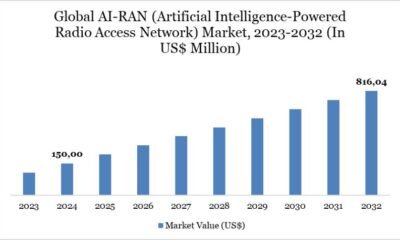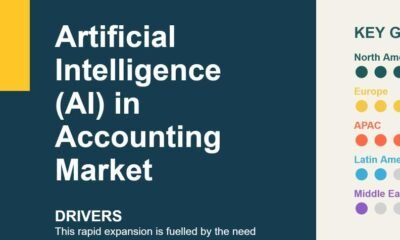According to a new report by InsightAce Analytic, the “Artificial Intelligence in Epidemiology Market Size is valued at 475.63 Million in 2024 and is predicted to reach 5271.80 Million by the year 2034 at an 27.4% CAGR during the forecast period for 2025-2034.
Request For Free Sample Pages:
https://www.insightaceanalytic.com/request-sample/1450
Latest Drivers Restraint and Opportunities Market Snapshot:
Key factors influencing global artificial intelligence in the epidemiology market are:
• Big data handling
• Early detection and surveillance
• Predictive modeling
The following are the primary obstacles to artificial intelligence in the epidemiology market’s expansion:
• Data quality and bias
• Ethical concern
• Dynamic nature of the disease
Future expansion opportunities for the global artificial intelligence in epidemiology market include:
• Earl’s detection of disease outbreaks
• Precision epidemiology
• Integration with the healthcare system
Market Analysis:
Artificial intelligence can be used to detect and track disease outbreaks by monitoring real-time health data, including social media, online searches, and electronic health records. This can provide timely insight into health risks. AI-based predictive models use machine learning algorithms to analyze various data sources and predict disease prevalence. These models help health officials and policymakers plan and implement targeted interventions. Thus, driving the market expansion.
List of Prominent Players in the Artificial Intelligence in Epidemiology Market:
• IBM Corporation
• Google Health
• Microsoft Healthcare
• Amazon web service
• IQVIA
• SAS institute
• Oracle health science
• Palantir tech
• Kinsa health
• Bluedot
• Epidemic
• Health map
Recent Developments:
• September 13, 2022: The National Institutes of Health (NIH) has begun investing $130 million over four years to accelerate the adoption of artificial intelligence (AI) in science and behavioral research.
• August 30, 2022: Penn Medicine and The Children’s Hospital of Philadelphia (CHOP) have established the Penn-CHOP Kidney Innovation Center to fund research aimed at improving patient care for both adults and adolescents with kidney injury.
• November 7, 2022: The University at Albany has announced plans to hire a record 27 new faculty members focused on artificial intelligence, kicking off the university’s ambitions to integrate AI training and development across all departments.
Artificial Intelligence in Epidemiology Market Dynamics:
Market Drivers: Data Processing And Analysis
The integration of artificial intelligence (AI) in epidemiology is transforming the way large and complex data sets-including electronic health records, genomic data, and social determinants of health-are processed and analyzed. AI-driven tools allow epidemiologists to identify patterns, trends, and correlations within vast amounts of health data, improving disease surveillance. Additionally, AI enhances real-time health monitoring, enabling early detection and rapid response to disease outbreaks.
Curious about this latest version of the report? @ https://www.insightaceanalytic.com/enquiry-before-buying/1450
Challenges: Data Quality And Bias
The effectiveness of AI in epidemiology heavily depends on the quality, completeness, and representativeness of the data used to train models. Incomplete or biased datasets can compromise accuracy, leading to misleading predictions and potential disparities in public health responses. Another major concern is the lack of transparency in AI decision-making, particularly in deep learning models, which are often viewed as “black box” systems.
North America Is Expected To Grow With The Highest CAGR During The Forecast Period
The use of artificial intelligence (AI) in epidemiology in North America has been impressive, with several initiatives, collaborations, and research efforts focused on using AI technology for public health. North America, particularly the United States and Canada, is home to many leading research institutions and universities in AI and epidemiology research. These labs collaborate on projects to develop artificial intelligence-based tools for disease surveillance, outbreak prediction, and data analysis. Healthcare in North America is increasingly using AI technologies for a variety of applications, including epidemiology.
Hospitals, health systems, and research institutions in the region are exploring how AI can improve disease detection, diagnosis, and treatment planning. North American public health agencies such as the US Centers for Disease Control and Prevention (CDC) and the Public Health Agency of Canada are actively participating in the use of AI for disease surveillance and response. This agency plays an important role in monitoring and controlling the spread of infectious diseases. Several North American technology companies and startups are actively contributing to the development of AI tools for epidemiology. This includes integrating artificial intelligence into health analytics platforms, wearables and other solutions that support healthcare efforts.
Get Specific Chapter/Information From The Report:
https://www.insightaceanalytic.com/customisation/1450
Segmentation of Artificial Intelligence in Epidemiology Market-
By Deployment
• Cloud-based
• Web-based
By Application
• Infection Prediction and Forecasting
• Disease and Syndromic Surveillance
By End-user
• Government and State Agencies
• Research Labs
• Pharmaceutical and Biotechnology Companies
• Healthcare Providers
By Region-
North America-
• The US
• Canada
• Mexico
Europe-
• Germany
• The UK
• France
• Italy
• Spain
• Rest of Europe
Asia-Pacific-
• China
• Japan
• India
• South Korea
• Southeast Asia
• Rest of Asia Pacific
Latin America-
• Brazil
• Argentina
• Rest of Latin America
Middle East & Africa-
• GCC Countries
• South Africa
• Rest of Middle East and Africa
Get More Information: @
https://www.insightaceanalytic.com/report/global-artificial-intelligence-in-epidemiology-market/1450
About Us:
InsightAce Analytic is a market research and consulting firm that enables clients to make strategic decisions. Our qualitative and quantitative market intelligence solutions inform the need for market and competitive intelligence to expand businesses. We help clients gain a competitive advantage by identifying untapped markets, exploring new and competing technologies, segmenting potential markets, and repositioning products. Our expertise is in providing syndicated and custom market intelligence reports with an in-depth analysis with key market insights in a timely and cost-effective manner.https://www.insightaceanalytic.com/images_data/148861653.
Contact Us:
info@insightaceanalytic.com
InsightAce Analytic Pvt. Ltd.
Visit: www.insightaceanalytic.com
Tel : +1 607 400-7072
Asia: +91 79 72967118
Follow Us on LinkedIn @ bit.ly/2tBXsgS
Follow Us On Facebook @ bit.ly/2H9jnDZ
Twitter: https://twitter.com/Insightace
This release was published on openPR.











































